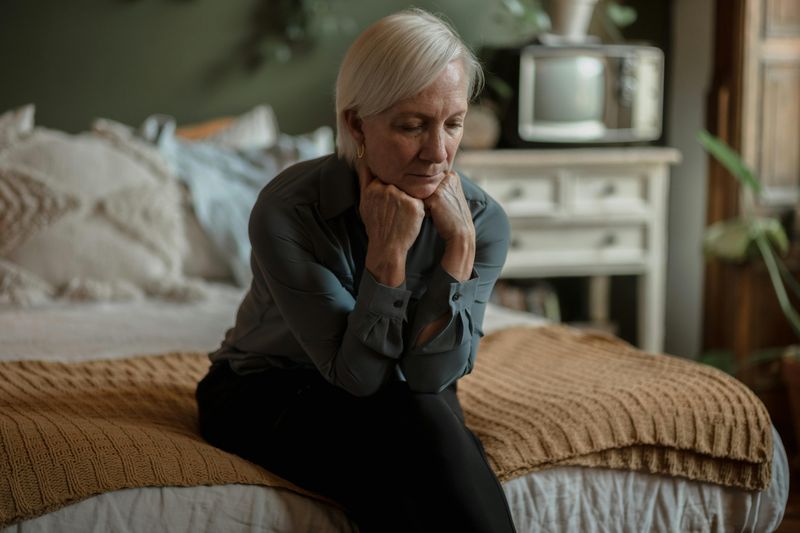10 Types of People Who End Up Lonely in Old Age—Even After Full Lives

Growing old doesn’t have to mean growing lonely, but for some people, it happens even after living full, busy lives. Sometimes the choices we make—or don’t make—about relationships shape our later years in unexpected ways. Understanding these patterns can help us build deeper connections now, so we don’t find ourselves isolated when we need companionship most.
1. The High-Achiever Who Prioritized Work Over Relationships

Building a career can feel like the ultimate goal, especially when success keeps rolling in. Some people dedicate decades to climbing ladders, earning titles, and making their mark on the world. Work becomes their identity, their purpose, and sometimes their only real source of validation.
But when retirement arrives or health forces them to slow down, that structure vanishes. Suddenly, the meetings and deadlines that filled their days are gone. Without close friendships or family bonds nurtured over the years, they face an emptiness that no trophy or paycheck can fill.
Human connection can’t be built overnight. Relationships need time, attention, and emotional investment—things often sacrificed in the pursuit of professional success.
2. The People-Pleaser Who Never Voiced Their Own Needs

Always saying yes sounds like kindness, but it can quietly erase who you are. People-pleasers spend their lives accommodating everyone else—listening, helping, fixing problems that aren’t theirs to solve.
On the surface, they seem loved and needed, but those relationships often lack true depth. Nobody really knows them because they never share their struggles or desires. Over time, this one-sided dynamic drains them emotionally.
When they finally need support in old age, they realize few people understand who they truly are beneath the helpful exterior. Genuine companionship requires honesty and vulnerability. Without it, even a crowded room can feel desperately empty.
3. The Lone Survivor Who Handled Everything on Their Own

Emotional resilience feels powerful, especially when you’ve weathered life’s storms without leaning on anyone. Some people find pride in facing heartbreak or disappointment alone, convinced it proves strength and composure.
They learn to bury pain deep, to smile through sorrow, and to fix every emotional wound in private. But that same quiet endurance can turn into a cage of solitude. Friends stop checking in because they always seem fine. Family assumes they don’t need support.
Over time, emotional self-sufficiency becomes a habit that shuts others out. Later in life, when grief, reflection, and vulnerability surface more often, that isolation grows heavier. Without the practice of sharing feelings or accepting care, even the strongest hearts can ache with loneliness.
4. The Charismatic Extrovert Whose Friendships Were Never Deep

Charm can open doors, but it doesn’t always build lasting rooms to live in. Extroverts who thrive on surface-level socializing often collect acquaintances instead of true friends. They’re the life of every party, always surrounded by laughter and conversation, yet rarely share anything vulnerable or real.
When life slows down and casual social circles fade, the shallowness becomes painfully obvious. Those fun connections don’t translate into people who check in during hard times. Without emotional depth, friendships dissolve when convenience disappears.
Loneliness isn’t about how many people you know. It’s about how deeply you’re known and whether anyone truly sees you beyond the entertaining exterior.
5. The All-Giver Whose Identity Was Defined by Service to Others

Caring for others can become an entire identity. Parents, caregivers, and volunteers pour themselves into service, finding meaning in being needed. For decades, their worth is measured by how much they give, how many people depend on them, and how selflessly they sacrifice.
But when children grow up, partners pass away, or communities move on, that role evaporates. Suddenly, they’re left without purpose or direction. They never learned to nurture themselves or explore personal interests outside of caregiving.
The void isn’t just about missing people—it’s about losing the sense of who they are. Without rediscovering themselves, old age becomes a lonely, purposeless stretch of time.
6. The Home-Bound Partner Who Lost the We but Forgot the Me

Some relationships become so consuming that individual identity fades completely. Partners who revolve their entire lives around their spouse lose track of personal hobbies, friendships, and dreams. Everything becomes about “we” instead of “me.”
When death or separation arrives, the loss is double-edged. They grieve not only their companion but also the version of themselves that existed within that partnership. Without a sense of self, rebuilding feels impossible.
Old age demands resilience and adaptability. Those who never cultivated their own identity struggle to navigate life alone. The emptiness isn’t just missing someone—it’s not knowing who they are without that person beside them.
7. The Perfectionist Who Never Invited Others Into the Mess

Perfectionists build walls disguised as polish and control. Everything must look right—the house, the image, the emotions. They avoid showing vulnerability, fearing judgment or appearing weak. Relationships remain surface-level because they never let anyone see the real, messy human underneath.
Over time, that emotional distance keeps people at arm’s length. Friends sense the barrier and stop trying to connect deeply. Family members feel they can never measure up or truly know the person behind the perfect facade.
Aging strips away illusions and demands authenticity. When perfectionists finally need genuine connection, they discover that years of guarding themselves have left them profoundly alone.
8. The Steady Routine Person Who Never Branched Out Socially

Predictability feels safe. Same job for decades, same friends since youth, same routines day after day. Routine-oriented people find comfort in stability and rarely venture outside their established circles. Why seek new connections when the old ones work just fine?
But life has a way of dismantling even the strongest routines. Jobs end, friends move away or pass on, and familiar patterns collapse. Suddenly, their narrow social world offers little support or companionship.
Building new relationships in old age feels daunting, especially without practice. Those who never learned to branch out socially find themselves stranded when life’s inevitable changes arrive, wishing they’d cultivated a wider, more adaptable network.
9. The Self-Reliant Individual Who Avoided Asking for Help or Connection

Pride can be a double-edged sword. The fiercely independent often see asking for help with physical tasks as weakness, something to avoid at all costs. They carry heavy boxes, climb ladders, or fix broken things alone, believing self-reliance equals strength and dignity.
Yet as energy fades and mobility wanes, that same independence becomes a source of isolation. Neighbors stop offering a hand because it’s always been declined. Family members hesitate to step in, unsure their help is wanted or needed. The circle of support quietly shrinks.
Aging calls for shared effort—accepting help, not as defeat, but as connection. Without that openness, even small chores turn into lonely challenges. The pride that once felt empowering becomes a silent barrier, keeping care and companionship just out of reach.
10. The Former Connector Whose Social Sphere Evaporated After Life Transitions

Once upon a time, they were the center of everything—hosting gatherings, organizing events, keeping everyone connected. Their calendar overflowed with activities, and their phone buzzed constantly with messages. Life felt vibrant and full of purpose.
But life transitions change everything. Children scatter across the country, careers end, friends pass away, and energy wanes. Slowly, that once-thriving social network disappears. Without actively rebuilding new connections, they watch their world shrink into silence.
Maintaining relationships requires ongoing effort, especially through major life changes. Those who assume their social sphere will sustain itself discover too late that connections need constant nurturing, or they simply fade away into loneliness.

Comments
Loading…